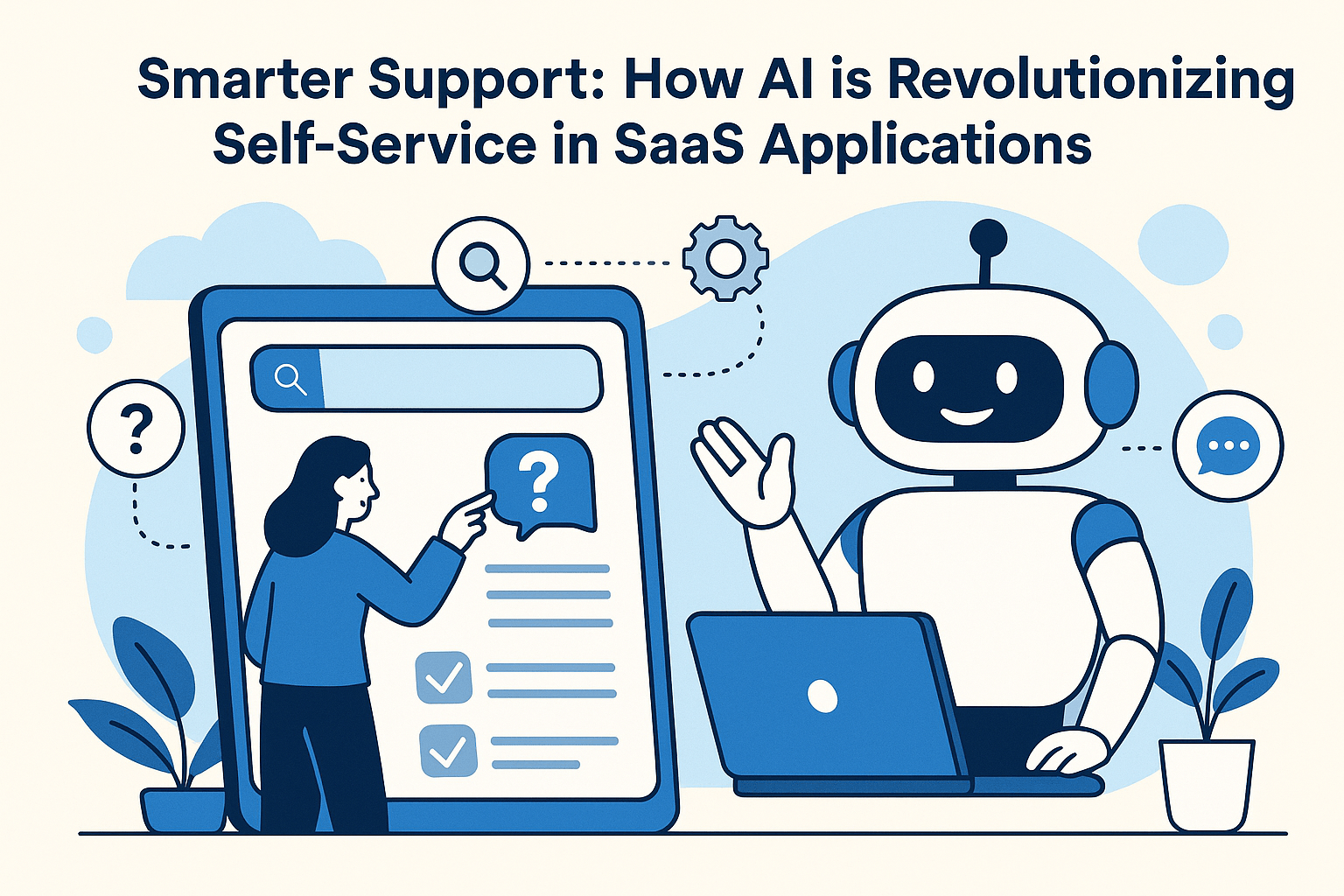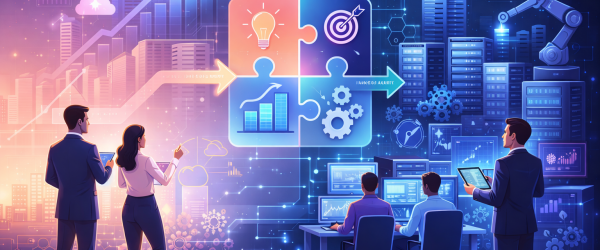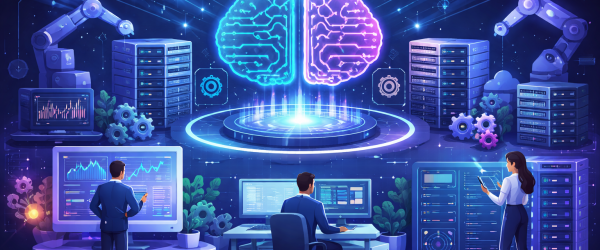Introduction
Let’s be real: No one wants to wait hours to get a support ticket answered, especially in today’s fast-moving digital world. When you’re using a SaaS product, every second counts—and users expect lightning-fast support. That’s where AI-powered self-service swoops in like a superhero.
AI is transforming the way SaaS platforms handle customer support. Gone are the days of clunky FAQs and outdated help docs. Now, AI-driven systems are answering questions, guiding users, predicting issues, and even fixing problems—before you even notice them.
Let’s explore how AI is flipping the script on self-service in SaaS.
Understanding AI in SaaS Context
What is AI in SaaS?
Artificial Intelligence in SaaS refers to the use of algorithms and machine learning to make software smarter—able to learn from data, improve user interactions, and automate support. It brings human-like intelligence to digital platforms, making them adaptive and intuitive.
Common Types of AI Used in SaaS
- NLP (Natural Language Processing): Understands and responds to human language
- ML (Machine Learning): Learns from user data and behavior
- Predictive Analytics: Forecasts issues before they happen
- Conversational AI: Powers virtual assistants and chatbots
Benefits of AI Integration for SaaS Providers
- Scales support without hiring more agents
- Personalizes the user experience
- Reduces operational costs
- Enhances product engagement
The Rise of Self-Service in SaaS
What is Self-Service Support?
Self-service support lets users solve problems on their own—without reaching out to a human agent. This can be through a help center, chatbot, or interactive walkthrough.
Traditional vs. AI-Powered Self-Service
Old-school self-service was passive: static FAQs and generic walkthroughs. AI makes it dynamic—understanding the context, predicting needs, and interacting with users like a human would.
Why Customers Love It
Let’s face it—users hate waiting. AI-powered self-service offers:
- Instant solutions
- 24/7 availability
- Personalized guidance
Key AI Technologies Powering Self-Service
Natural Language Processing (NLP)
NLP is like teaching machines to understand and speak human. It’s the backbone of AI chatbots. Users can type or even speak queries, and AI deciphers intent, not just keywords.
Machine Learning and Predictive Analytics
ML helps systems get smarter over time. By analyzing usage patterns, AI can suggest answers before users even ask questions. It’s like having a support agent who knows what you’re going to ask—before you ask it.
Conversational AI and Virtual Assistants
These AI agents simulate human conversation. They can:
- Answer FAQs
- Walk users through tasks
- Escalate to human agents when needed
Generative AI for Dynamic Help Content
AI can now generate customized support articles, guides, and tooltips. Instead of sending every user to the same doc, it can create personalized instructions based on user data.
Real-World Applications of AI in Self-Service
Smart Search Engines
Forget keyword searches. AI-driven search tools use semantic analysis to deliver the most relevant results—even if the search terms are vague.
Interactive Chatbots
These bots don’t just respond—they guide. They:
- Answer complex queries
- Route tickets smartly
- Offer in-context help
Guided Workflows
Onboarding and troubleshooting can be overwhelming. AI-powered workflows offer step-by-step assistance tailored to the user’s product usage and needs.
Self-Healing Systems
Yes, software can now heal itself. AI monitors for anomalies and triggers auto-fixes, reducing downtime without user involvement.
Benefits of AI-Enhanced Self-Service for SaaS
Faster Issue Resolution
No more waiting for ticket queues. AI responds instantly with accurate solutions.
Reduced Support Costs
By handling Tier-1 queries, AI frees up human agents for more complex tasks—cutting down operational costs.
24/7 Global Support
AI never sleeps. Whether it’s 3 PM in New York or 3 AM in Tokyo, users get support.
Improved Customer Retention
Quick support = happy users. Happy users = loyal customers.
Challenges and Considerations
Data Privacy and Security
AI relies on data, and handling that responsibly is crucial. Companies must ensure data compliance and transparency.
Maintaining the Human Touch
AI is great—but it shouldn’t feel cold. Balance automation with empathetic, human-like interactions.
AI Bias and Ethics
AI learns from data. If that data is biased, AI could reflect those biases. Constant monitoring and ethical training are essential.
How to Implement AI-Powered Self-Service
Step 1: Evaluate Current Support Needs
Look at existing support tickets. What are the recurring issues? Which ones can be automated?
Step 2: Choose the Right AI Tools
Options include:
- Chatbot platforms like Intercom or Drift
- Knowledge management systems with AI search
- Workflow automation tools
Step 3: Train and Monitor Continuously
AI is not “set and forget.” Feed it good data. Test responses. Improve constantly.
Case Studies
Salesforce’s Einstein Bot
Einstein Bot automates customer support with NLP and integrates deeply into CRM workflows. It offers predictive suggestions and supports multi-channel communication.
Zendesk AI
Zendesk’s AI helps users navigate help centers with smart recommendations, auto-ticket tagging, and self-service triggers.
Intercom’s Fin AI
Fin is a GPT-4 powered bot that provides rich, accurate answers from help documentation and learns continuously from customer interactions.
Future Trends in AI Self-Service
- Hyper-Personalization: Dynamic experiences based on real-time user behavior
- Multilingual & Omnichannel Support: Support across platforms and languages
- Proactive Support: AI anticipates problems before the user even knows
Conclusion
AI isn’t just a tech trend—it’s a full-blown revolution in how SaaS platforms deliver support. With smart self-service powered by AI, users are empowered, support teams are unburdened, and companies thrive with better efficiency and happier customers.
Ready to supercharge your SaaS platform? It’s time to let AI take the front seat in self-service support.
FAQs
1. What is AI-powered self-service in SaaS?
It’s the use of AI technologies like chatbots, NLP, and machine learning to help users solve problems on their own—without contacting support agents.
2. Can AI replace human customer support completely?
Not completely. AI handles routine queries well, but human agents are still essential for complex, emotional, or unique situations.
3. How secure is AI in handling user data?
It depends on implementation. Leading SaaS platforms use encryption, compliance protocols (like GDPR), and anonymization to protect user data.
4. Is AI only for large SaaS companies?
No. With many plug-and-play AI tools available, even small SaaS startups can implement AI-enhanced self-service cost-effectively.
5. How soon can I expect ROI from AI in support?
Many companies see ROI within months through reduced ticket volume, faster resolutions, and higher customer satisfaction.







